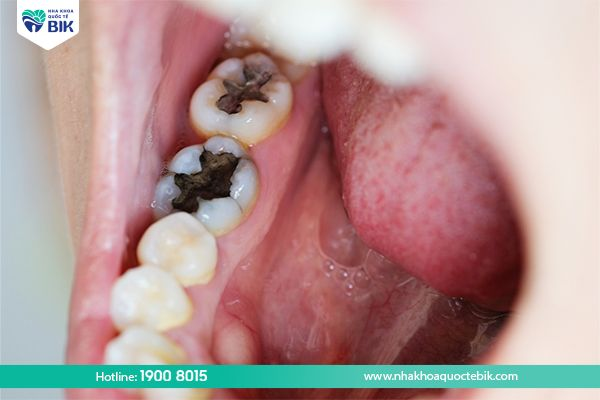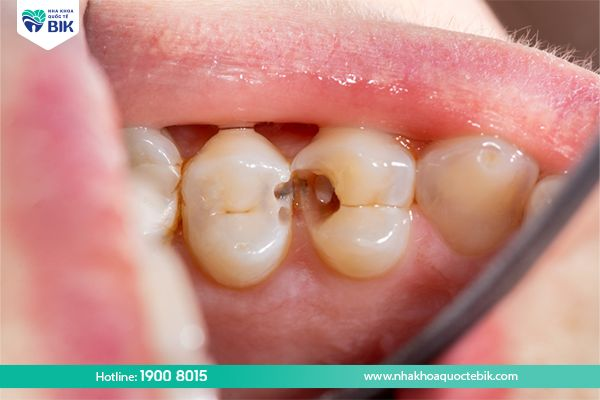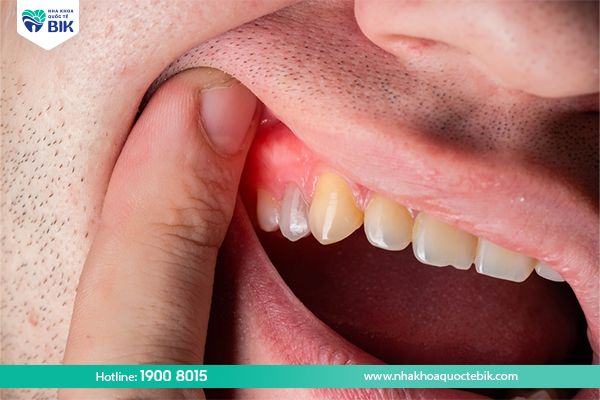Tooth decay is considered one of the most common diseases today that can occur in both adults and children. The main cause of tooth decay is due to improper oral care, which creates favorable conditions for bacteria to attack tooth enamel. Let’s refer to the article below to learn more about the causes as well as the signs of tooth decay.
1. What is tooth decay?
Tooth decay is a condition in which teeth lose hard tissue due to the demineralization process by harmful bacteria on dental plaque, thereby forming tiny holes in the teeth. This disease occurs due to many factors, including harmful bacteria in the oral cavity, frequent snacking habits, use of foods and drinks containing a lot of sugar, and poor oral hygiene.
Tooth decay is considered by experts to be the most common oral disease today, especially likely to occur in children and the elderly. But anyone can get this disease, even infants. Although it is a common disease, it is also potentially dangerous. If not treated promptly, the decay will become more and more severe and affect the tooth pulp. From there, it causes symptoms such as toothache, infection or, more dangerously, permanent tooth loss.

2. Causes of tooth decay
The two main causes of tooth decay are harmful bacteria in the oral cavity and plaque and food stuck between teeth. In fact, the presence of bacteria in the oral cavity is normal, in which Streptococcus mutans, Lactobacillus and Actinomyces species will secrete acids during the process of decomposing sugar in leftover food. These acids can erode the enamel coating on the outside of the teeth and thereby create cavities. 
Some common causes of tooth decay include:
– Frequent snacking habits: Some patients have the habit of eating candies, cookies, chocolate or carbonated soft drinks – foods with very high sugar content, which will create an environment for bacteria to attack more strongly.
– Using a lot of highly acidic foods: Foods such as lemon, vinegar, and fruit juice, when consumed in large quantities, will gradually erode tooth enamel.
– Improper oral hygiene habits: Not brushing your teeth at least twice a day or not brushing thoroughly, using rough, hard toothbrushes that are not suitable for your teeth.
– Dry mouth: If the amount of saliva secreted in the mouth is too little, it will also cause difficulty in removing remaining food particles.
– Gum recession: Gum recession will easily occur due to the aging process of the body’s organs. Plaque on the tooth roots will form if the gums recede from the jaw, from here causing bacteria to attack the tooth roots more and more.
– Fluoride deficiency: If the teeth are deficient in the trace element fluoride, your oral health will decline significantly and you will be easily vulnerable to the effects of bacteria.
– Suffering from other diseases: If the patient has gastroesophageal reflux, stomach acid can also come into contact with the teeth, causing tooth erosion, which can lead to tooth decay over time.
3. Signs of tooth decay
Here are some of the most common signs of tooth decay:
3.1. Teeth become sensitive
When the patient eats or drinks foods or drinks that are too hot or cold, there will be pain. This is one of the typical signs that the teeth are starting to be attacked by bacteria and if not treated promptly, the decay can progress more severely, causing the teeth to weaken and become loose.

3.2. Black spots appear on the tooth surface
Black spots gradually appearing on the tooth surface is one of the easiest signs to observe with the naked eye, but some patients do not pay attention to this sign. When they first start, these spots are only slightly darker than the tooth color, but over time the black spots begin to spread to the tooth surface and become darker. In some other cases, tooth decay will cause white spots or light-colored streaks to appear on the tooth.
3.3. Cavities appear
Harmful bacteria attack the teeth and form small holes in the teeth or create gaps between the two sides of the teeth, making it easy for food particles to get stuck. If these plaques are not cleaned, they will create a favorable environment for bacteria to grow rapidly.
This is one of the most obvious signs of tooth decay, so as soon as you see cavities appear, you need to go to the dentist for treatment as soon as possible.

3.4. Swollen, bleeding gums
When you have tooth decay, harmful bacteria multiply, making the gum tissue more sensitive. If there is an impact force, such as when you brush your teeth or use dental floss, the gums may bleed and become infected. When this happens, it means that the decay is at an alarming level and you need to be treated immediately if you do not want to experience other dangerous complications.
3.5. Bad breath
Food debris, if not cleaned, will get stuck in the teeth or cavities, creating favorable conditions for harmful bacteria to reside and develop, creating an unpleasant odor in the breath. In addition, bacteria also cause a bitter taste in the mouth, making you feel like eating is not delicious.

3.6. Pain when eating
When chewing food or brushing your teeth in a deep position, you will feel a sharp pain coming on. The reason is because the bacteria from tooth decay attack, causing the dentin to erode and affect the nerve of the tooth, causing toothache and sensitivity.
4. Dangerous complications of tooth decay
Due to its popularity, many parents are still subjective when their children have tooth decay. However, tooth decay can cause serious and long-term complications even when children do not have permanent teeth. Complications may include:
– Swelling or pus around the tooth
– Toothaches
– Tooth abscess
– Chipped, cracked, broken or fractured teeth
– Difficulty chewing

And the complications will be more serious when tooth decay progresses severely:
– Toothache causes obstacles and difficulties in daily life
– Can cause permanent tooth loss, affecting aesthetics as well as confidence in communication
– Difficulty eating can cause weight loss, malnutrition, physical weakness
– In some rare cases, patients may have tooth abscesses causing infections and the most dangerous is that they can be life-threatening.
5. How to prevent tooth decay
To effectively prevent tooth decay, you should note the following:
5.1. Proper oral hygiene
– Maintain the habit of brushing your teeth at least twice a day, especially after each meal to completely remove plaque on the tooth surface, avoiding the formation of dense tartar that creates conditions for bacteria that cause tooth decay to grow.
– Note that you should brush your teeth at least once every 3-4 months to avoid bacteria accumulating and causing tooth decay.
– Choose the right toothpaste, you can consider some types of toothpaste to treat tooth decay.
– Combine the use of dental floss or a water flosser to completely remove food debris deep in between teeth, where the toothbrush cannot clean.

5.2. Reasonable diet
Daily diet is also one of the important factors affecting oral health. One of the leading causes of tooth decay is foods high in sugar and starch. The reason is because these substances are easily converted into tartar when present in the oral cavity. In addition, you should also limit eating at night, 30 minutes before going to bed, you should not eat anything to avoid bacteria growing while sleeping when the salivary glands are not active.
Thus, although tooth decay is one of the most common diseases today, you should not be subjective. If you notice some common signs of tooth decay such as toothache, sensitivity, swollen gums, cavities, etc., you should go to a dental facility immediately for timely examination to avoid dangerous complications that may occur later.


















